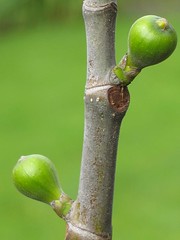In West Bank, a First Hint of Agriculture: Figs
By JOHN NOBLE WILFORD
In the ruins of a prehistoric village near Jericho, in the West Bank, scientists have found remains of figs that they say appear to be the earliest known cultivated fruit crop, perhaps the first evidence anywhere of domesticated food production at the dawn of agriculture. The figs were grown some 11,400 years ago.
Presumably that was well after Adam and Eve tried on the new look in fig leaves, in which case the fig must have grown wild in Eden.
Two botanists and an archaeologist, who describe the discovery in today's issue of the journal Science, said the figs came from cultivated trees that grew about 1,000 years before such staples as wheat, barley and chickpeas were widely domesticated in the Middle East. These grain and legume crops had been considered the first steps in agriculture.
The researchers uncovered nine small figs in the ruins of a burned building. The fire left the figs charred, preserving them in a condition for detailed analysis. The researchers established the age of the cache by dating the fire's remains.
A comparison with modern wild and domesticated varieties, the scientists said, led them to conclude that the ancient figs had undergone a mutation in the wild that produced a sweet fruit but no fertile seeds.
Because these trees were a reproductive dead end, the botanists reasoned, they could have been propagated only by people planting shoots of the variant strain again and again. A piece of stem stuck in the ground will sprout roots and grow into a tree, which could explain why figs were domesticated much earlier than grapes, olives and other fruit plants.
The archaeobotanists who conducted the study were Mordechai Kislev and Anat Hartman of Bar-Ilan University in Israel. Their co-author of the journal report was Ofer Bar-Yosef, an archaeologist at the Peabody Museum of Harvard.
In an interview by telephone from Israel, Dr. Bar-Yosef said that he was "confident about the identification of the figs as being of a domesticated variety" and that they were probably the earliest known domesticated crop. The cultivation technique, he said, seemed to be well enough advanced to suggest that people had thus been intervening in nature for several centuries.
NY Times June 2, 06
Sunday, June 04, 2006
Subscribe to:
Post Comments (Atom)


No comments:
Post a Comment